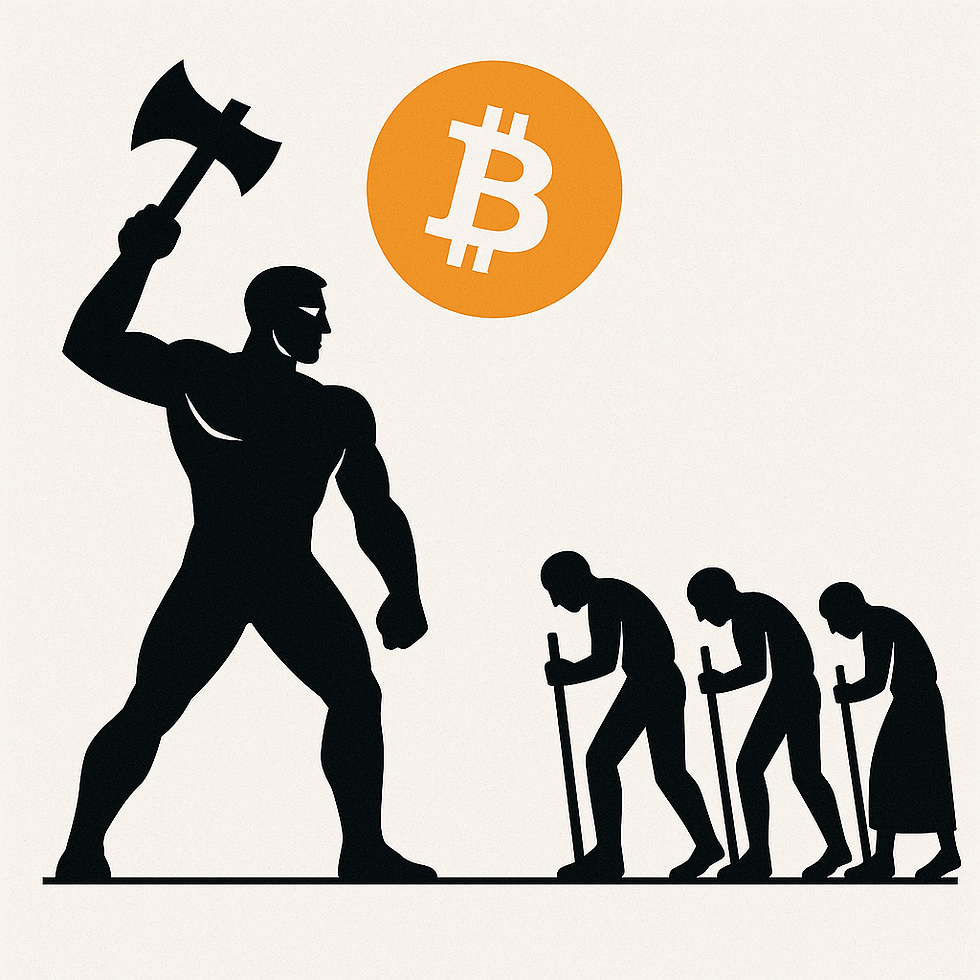The Bitcoin Illusion — Who Really Owns the Future of Crypto?
- WireNews

- May 24, 2025
- 3 min read
by Ram ben Ze’ev

Bitcoin was born in rebellion. A decentralised, peer-to-peer digital currency designed to free the world from the grip of banks and governments. It promised a new age of financial freedom — incorruptible, transparent, and democratic.
But behind the marketing slogans and techno-utopian rhetoric lies a hard truth: Bitcoin is no longer the currency of the people. It is the asset of the elite. And recent figures make that truth inescapably clear.
The Top Ten Titans of Bitcoin
According to a recent report, the following companies currently hold staggering amounts of Bitcoin:
BlackRock – 636,108 BTC
Binance – 629,190 BTC
MicroStrategy – 576,230 BTC
Grayscale – 231,646 BTC
Fidelity – 199,831 BTC
Upbit – 174,332 BTC
Block.One – 164,000 BTC
Bitfinex – 159,142 BTC
Kraken – 157,912 BTC
Galaxy Digital – 140,000 BTC
In total, these ten entities control approximately 3,068,391 BTC — which represents more than 15.5% of the entire existing supply of roughly 19.7 million Bitcoins. This isn't decentralisation. This is oligarchy — and it's hiding in plain sight.
The Myth of Decentralisation
Bitcoin evangelists proudly declare that no one controls the network — that it is trustless and fair. But with just a handful of companies holding billions in BTC, the dream of decentralisation has long since been replaced by a reality of centralised wealth and power.
Ownership concentration at this level gives these corporations the ability to dominate the market, influence sentiment, and shape policy — exactly what Bitcoin was meant to resist.
Market Manipulation in Disguise
With this level of control, the major holders can easily move markets through coordinated trades, rumours, or sudden sell-offs. Bitcoin’s volatility is not an accident; it’s a feature that serves the largest players.
Retail investors are left with nothing more than guesses and gut-feelings, gambling in a game where the house always wins — and the house is now Wall Street.
Post-Halving Centralisation
Every four years, Bitcoin’s block reward is halved — reducing the number of new bitcoins given to miners. While this may create artificial scarcity, it also makes mining less profitable, especially for smaller participants.
As rewards decline and costs remain high, only the largest, best-funded players survive, further centralising control of the network. The same companies listed above — many with mining stakes — are positioned to dominate not just the holdings but the very infrastructure of Bitcoin.
Not a Currency, Just a Casino Chip
Let’s be honest: none of these companies are using Bitcoin as money. They are not paying staff in BTC, conducting trade, or facilitating consumer-level payments. They are buying and holding it as a speculative asset — betting that its price will rise.
Bitcoin is not functioning as a medium of exchange. It is functioning as a volatile, highly concentrated, high-stakes bet — attractive to institutions because retail investors continue to play the role of liquidity providers.
A System Built on Faith, Not Function
This much is clear: Bitcoin’s future is not grounded in utility, efficiency, or adoption. It’s grounded in faith — in the belief that its price will go up. That faith is increasingly manipulated by the very actors Bitcoin sought to exclude.
And when that faith erodes — as it inevitably will — the system will collapse under the weight of its contradictions: slow, expensive transactions, dwindling mining rewards, institutional manipulation, and the hollow narrative of decentralised liberation.
Conclusion: The Curtain Has Been Pulled Back
Bitcoin may continue to exist. It may even remain profitable — for the top 1% of holders. But as a currency, it has failed. As a decentralised system, it has failed. And as a promise, it has become a lie.
The halving schedule doesn’t herald digital revolution. It simply delays the inevitable: a slow and steady concentration of power in fewer hands, while the public continues to believe they are holding the keys to their own freedom.
It’s time we called Bitcoin what it has become — not a revolution, but a repackaged system of control, dressed in code and cloaked in myth.
>>>> BUY ME A COFFEE <<<<
###
Bill White (Ram ben Ze'ev) is CEO of WireNews Limited, Mayside Partners Limited, MEADHANAN Agency, Kestrel Assets Limited, SpudsToGo Limited and Executive Director of Hebrew Synagogue








